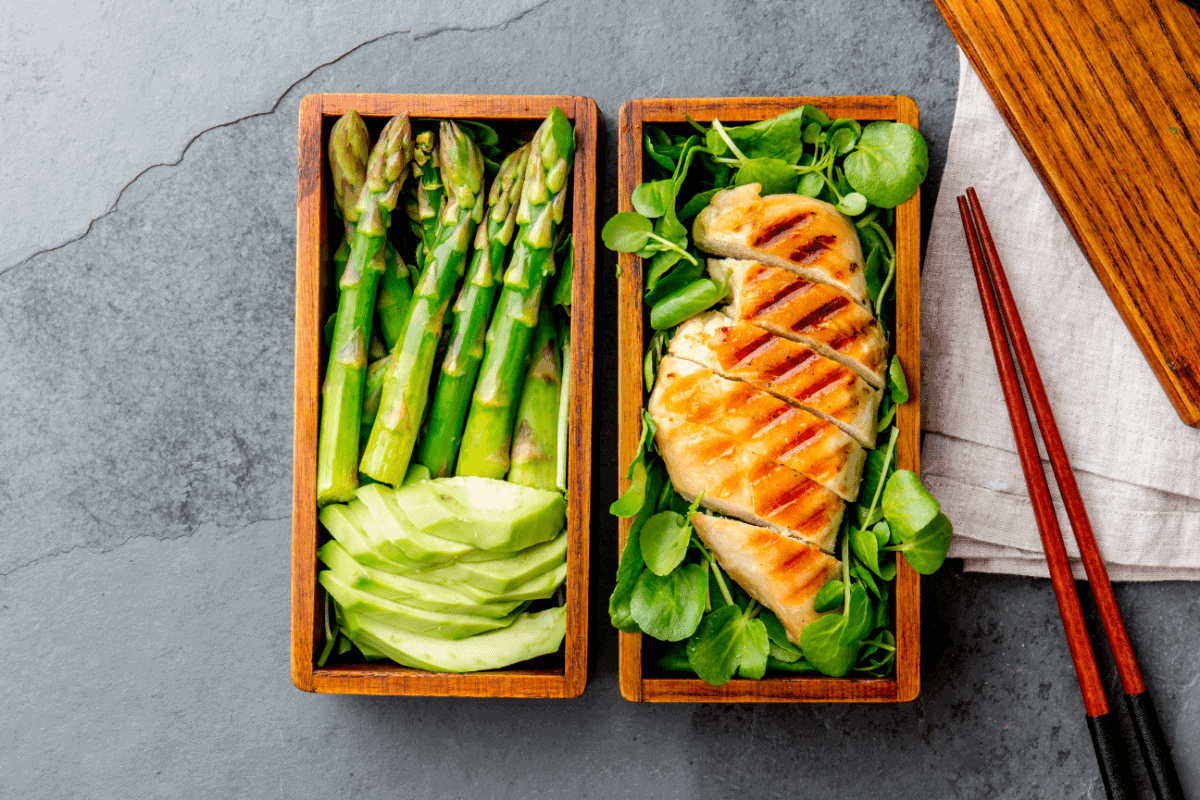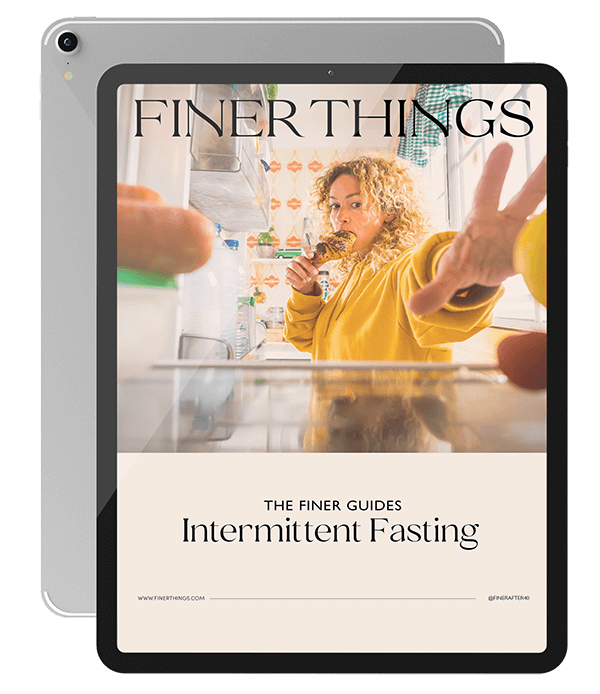How Time Changes Our Nutrition: Foods for Women Over 40

By Franki Hanke
Whether for wellness or losing weight, nutrition changes as we age.
Nutrition is important our entire lives. However, as we age our needs can change, especially around menopause. Nutrition for women over 40 will be different than for a twenty-year-old, but every woman will be different too. For overall wellness, consider what your meal plan looks like.
Remember nutrition isn’t everything.
Diet is only one lifestyle factor. For weight loss and overall health, there’s more at play. Other important aspects are health screenings, stress, sleep, and physical activity.
Especially if you’re trying to lose weight, remember genetics play a huge role in our health and body, and that’s out of your control.
Check Your Diet: Key Nutrients for Women Over 40.
While food isn’t medicine, food is the source of many key nutrients the body needs. Consider your current diet: Are you eating everything you need? It’s always best to focus on consuming nutrients through whole foods rather than supplements.
If you think you need supplemental nutrients, consult with your physician and/or dietitian.
Iron
Iron is important for blood production. Most iron goes into red blood and muscle cells. For women over 40, the overall recommended amount is 18 milligrams daily. When they turn 50 the recommended amount drops to 8mg.
Iron-rich foods include red meat, poultry, fish & shellfish, egg yolks, leafy greens, bean or lentils, fortified bread or cereals, nuts or seeds, and dried fruits.
Calcium
Calcium supports bone health. As we age, osteoporosis, defined as a loss in bone density, is a common concern. While calcium consumption is not the only factor for avoiding osteoporosis, less calcium is absorbed by the body as we age and after menopause, so we may need to consume more than previously. For women over 40, the overall recommended amount is 1,000 to 1,200 milligrams a day.
Calcium-rich foods include dairy products, tofu, leafy greens, and cruciferous vegetables.
Vitamin D
Hand-in-hand with calcium, vitamin D helps in the absorption of calcium and manages it throughout the body.
Find Vitamin D in fish sources, eggs, fortified milk, and sunlight.
Omega 3 Fatty Acids
Omega-3 Fatty Acids are essential fats, the body cannot produce them. Instead, we have to ingest them. Omega-3 fats are used in cell membranes and are important for hormones that regulate a host of functions. Omega-3s have shown to significantly reduce the risk of heart disease and are used to treat high blood pressure.
Omega-3 Fatty Acids are found primarily in fish, so two servings of fatty fish are recommended a week. Consider salmon, mackerel, herring, lake trout, sardines, or albacore tuna. In addition to fish, find them in flaxseeds, canola oil, walnuts, and soybeans.
If you’re not sure where to start with consuming more fish, try going Greek. The oft-lauded Mediterranean diet is long-standing for a reason. Omega-6 is a key nutrient in olive oil while fish contains omega-3s. Balancing these two can yield the benefits of both, plus antioxidants from olive oil. Besides the health benefits, the light, often lemony flavors of Greek-styles recipes are good for the soul, too.
Phytoestrogens
A compound found in some plants, namely soy, phytoestrogens have been connected with moderate benefits for bone and cardiovascular health and a minor decrease in the risk of cancer forming for older individuals. However, their benefits are not considered scientific fact yet, based on the amount of research previously done. The key is moderation.
Phytoestrogens can be found in soybeans and their products, bran, flaxseeds, and beans. Soy is the main method for consuming phytoestrogens whether in soy milk, tofu, tempeh, or edamame. When adding soy to your diet, opt for whole foods rather than supplements like protein bars, processed foods, or powders.

Adjust Your Diet: the Metabolic Slowdown.
As estrogen, progesterone, and human growth hormone decrease, the metabolism slows. Oftentimes, this results in unwanted weight gain. At age 40, it may be harder to manage or lose weight as the body burns fewer calories daily.
Adjust your basic diet to adjust.
Get The Finer Life
Our Sunday email has tips and content you will love – exclusively for our subscribers.
"*" indicates required fields
→ Consume more vegetables.
Most people already don’t consume enough veggies, especially leafy greens. Research shows and agrees that we could all benefit from consuming more leafy greens. They contain hundreds of nutrients from potassium to Vitamin C to magnesium that we need.
→ Choose whole grains and lean proteins over their alternatives.
Look for easy swaps for adding more protein to your diet. Cottage cheese is an easy snack food that’s rich in calcium and protein.
→ Add two to three servings of fatty fish into your weekly meal plan.
Especially if you’re watching your cholesterol, fatty, cold-water fish can introduce “healthy fats.” Focus on finding fish you like, even if that’s canned tuna, rather than comparing stats.
→ Introduce additional servings of soy into your diet.
Soy milk is the easiest way for many people to bring in more soy whether in your coffee, tea, or smoothies, but experiment with tofu or tempeh, too.
→ Minimize carbohydrates or swap for low-carb alternatives.
Carbohydrates should be balanced in moderation. Blood sugar and body weight are largely affected by carb intake. A nutritionist can make specific recommendations for balancing carb intact.
While a healthy weight is important, overall wellness and an enjoyable, sustainable meal plan are more important. Don’t obsess over weight loss. Instead, focus on healthy habits that may contribute to losing weight but offer their own health benefits, too.
Overall, the research shows that goal should be a varied diet that focuses on eating more whole grains, vegetables, fish, nuts, lean protein sources, and low-fat dairy. Ignore fad diets or anyone claiming a simple solution to losing weight, curing disease, or being healthy. The best diet is balanced for you.
Support Nutrition with Exercise.
If you’re dieting as part of a weight-loss plan, you’re likely already introducing exercise. However, even if the goal isn’t weight loss, physical activity is important for overall health.
In particular, research shows that strength training provides unique benefits that shouldn’t exist only for beefy guys. Strength training prior to, and after, menopause can lessen the changes in muscle tone, muscle mass, and the accumulation of belly fat as you age. Add strength training into your preferred cardio.
In addition to dedicated exercise, introduce more motion throughout your day: stretch breaks, walks, and taking the stairs are all beneficial habits. If you’re not sure what workouts to do, consider downloading an app to guide you.
We live in a world oversaturated with claims and propaganda surrounding nutrition, health, and especially weight loss. Don’t fall for fad diets. Focus on a balanced diet rich with nutrients and meals that end with satiety and satisfaction for sustainable nutrition.

Want a Free Guide?
You will receive our free 19-page guide and access to our exclusive content, private invitations, and tips you’ll love.
"*" indicates required fields
Facebook Group




